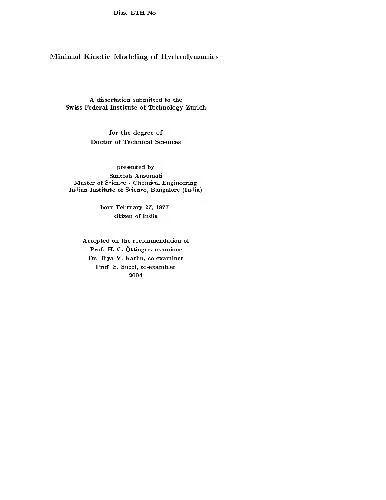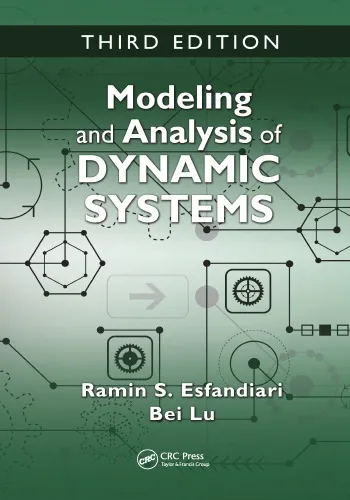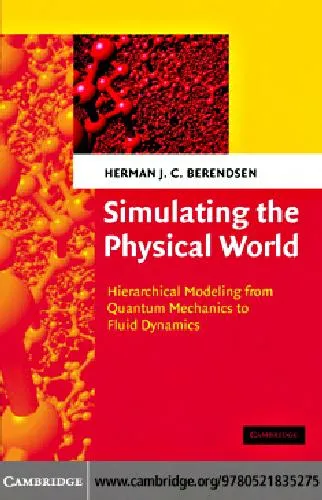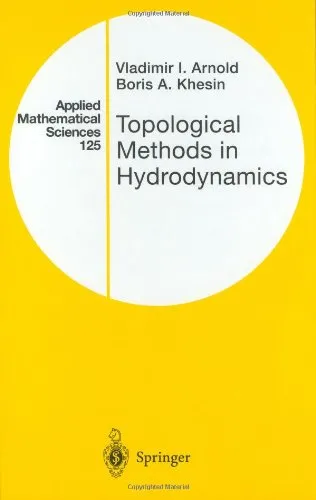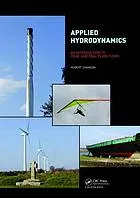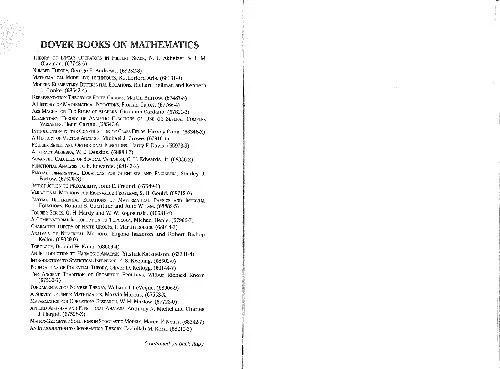Minimal Kinetic Modeling of Hydrodynamics
4.0
بر اساس نظر کاربران

شما میتونید سوالاتتون در باره کتاب رو از هوش مصنوعیش بعد از ورود بپرسید
هر دانلود یا پرسش از هوش مصنوعی 2 امتیاز لازم دارد، برای بدست آوردن امتیاز رایگان، به صفحه ی راهنمای امتیازات سر بزنید و یک سری کار ارزشمند انجام بدینکتاب های مرتبط:
مقدمه کتاب
کتاب Minimal Kinetic Modeling of Hydrodynamics یکی از آثار برجسته در حوزه مدلسازی هیدرودینامیک با استفاده از رویکردهای کمینهای است. این کتاب تلاشی منحصربهفرد برای ترکیب علمی دقیق و شهودی ساده به منظور توضیح حرکات سیالات و رفتار سیستمهای پیچیده با استفاده از روشهای نوین مدلسازی است. این کار به طور خاص به مطالعه تعامل بین dynamics سیستم و رویکردهای multi-scale در سطح microscopic میپردازد، و بررسی جامعی از ابزارهای مدرن در مکانیک سیالات را ارائه میدهد.
خلاصهای از کتاب
این کتاب در چند فصل به عمق مفاهیم اساسی مدلسازی سینتیکی و تئوری هیدرودینامیک میپردازد. قدمهای ابتدایی به معرفی اصول اولیه میپردازند، جایی که خواننده با مفهوم kinetic theory، کاربردهای آن در hydrodynamics و اهمیت استفاده از lattice Boltzmann methods آشنا میشود. بخشهای میانی، چالشهای پیشروی سیستمهای پیچیده را شرح میدهند و در عین حال رویکردهای محاسباتی سریع و کارآمد برای حل آنها پیشنهاد میکنند.
نویسنده در بخشهای پایانی با جزئیات به بررسی جنبههای کاربردی این مدلسازیها در زمینههای علمی مختلف مانند شبیهسازی جریانهای پیچیده سیال، مسائل مرتبط با انتقال حرارت و کاربردهای صنعتی دیگر پرداخته است. ترکیب مباحث نظری و عملی در این کتاب، آن را به منبعی ارزشمند برای دانشجویان و متخصصان در رشتههای مرتبط با physics، مهندسی مکانیک و مهندسی شیمی تبدیل کرده است.
نکات کلیدی کتاب
- معرفی روشهای lattice Boltzmann و کاربرد آن در جریانهای سیال پیچیده.
- تجزیه و تحلیل چندمقیاسی (multi-scale analysis) برای سیستمهای پویا.
- درک رفتار ذرات microscopic در تعامل با macroscopic effects.
- کاربردهای عملی در شبیهسازی، از جریانهای صنعتی تا مدلسازی الگوی جریان در فیزیک.
- ایجاد توازن بین پیچیدگی مدلسازی و سادگی ریاضیاتی.
جملات معروف از کتاب
"Understanding hydrodynamics is not merely a theoretical journey—it is the art of connecting microscopic chaos to macroscopic order."
"Minimalism in modeling does not imply oversimplification, but rather extracting the essential physics for efficient computation."
چرا این کتاب مهم است؟
کتاب Minimal Kinetic Modeling of Hydrodynamics اهمیتی دوچندان برای جامعه علمی دارد، چراکه نیازهای روزافزون به مدلسازی دقیق و سریع در دنیای امروز را برآورده میکند. روشهای lattice Boltzmann و دیگر ابزارهای نوین ارائهشده در این اثر، به پژوهشگران این امکان را میدهد که فرآیندهای پیچیدهای را با سرعت و دقت بالا شبیهسازی کنند. علاوه بر این، نگاه مینیمالیستی نویسنده در ارائه نظریهها و روشها، باعث میشود که این کتاب همچنان برای مخاطبان گستردهای از دانشجویان گرفته تا پژوهشگران حرفهای جذاب باقی بماند.
این کتاب نهتنها بهروزترین تکنیکها را ارائه میدهد، بلکه به خوانندگان کمک میکند تا از ابزارهایی نظیر kinetic simulations و computational fluid dynamics برای ارائه راهحلهای جدید در مسائل روزمره استفاده کنند. بدون شک، این اثر نقشی کلیدی در ارتقاء دانش مکانیک سیالات ایفا میکند.
Introduction to "Minimal Kinetic Modeling of Hydrodynamics"
Welcome to "Minimal Kinetic Modeling of Hydrodynamics", a comprehensive yet accessible exploration into the fascinating intersection of fluid dynamics and kinetic theory. This book is tailored for readers who aim to deepen their understanding of how complex hydrodynamic systems can be modeled efficiently while keeping the mathematical and computational effort to a minimal yet accurate level. It offers an innovative approach to tackling one of physics' most enduring challenges: modeling fluid motion with precision and simplicity.
Fluids play an integral role in countless natural and industrial processes, from weather systems to engineering applications. However, modeling their behavior accurately often demands intricate mathematical frameworks and immense computational resources. This book addresses that challenge head-on, presenting a systematic approach to "minimal kinetic modeling." By combining fundamental concepts from classical mechanics and cutting-edge insights into computations, it provides a framework both scientifically rigorous and practically feasible. Whether you're a physicist, mathematician, engineer, or computational enthusiast, this book offers a fresh perspective that bridges theory and implementation.
Detailed Summary of the Book
The book is divided into carefully structured chapters, each building on the last to form a cohesive storyline. It begins with an intuitive introduction to fluid dynamics and kinetic theory, offering readers a strong foundation in the basic principles governing the motion of particles and fluids. The early sections focus on breaking down classical hydrodynamics equations—like the Navier-Stokes equations—and exploring their limitations in practical applications.
As the discussion progresses, the book delves deep into the concept of kinetic modeling, emphasizing how the behavior of fluids at a macroscopic scale can be derived from microscopic particle interactions. It introduces "minimal kinetic models," which strike a delicate balance between physical accuracy and computational simplicity.
Key concepts like the Boltzmann equation, moments closure methods, and reduced modeling are explained in meticulous detail. Practical tools and techniques—such as lattice Boltzmann methods and moment-based models—are explored to provide readers with hands-on methodologies to simulate and predict fluid behaviors effectively. The book also addresses real-world applications: how minimal kinetic models can be adapted to simulate turbulence, aerodynamics, heat transfer, and other complex fluid processes.
One of the standout features of the text is its use of diagrams, examples, and exercises. These supplemental components make intricate subjects more approachable, engaging, and applicable. By the end of the book, readers will have not only conceptual clarity but also the practical expertise to implement minimal kinetic modeling in their own research or projects.
Key Takeaways
- A thorough understanding of fluid dynamics and kinetic theory, presented in a clear and digestible format.
- Practical insights into minimal kinetic modeling, allowing for efficient yet accurate simulations of complex hydrodynamic systems.
- Step-by-step analyses of classical modeling techniques and their modern counterparts, such as the lattice Boltzmann method.
- A balanced approach to mathematical rigor and practical applicability in real-world scenarios.
- Tools and frameworks to bridge the gap between theoretical physics and cutting-edge computational science.
Famous Quotes from the Book
"Fluid motion encompasses boundless complexity, but even the most intricate systems are born from simple interactions."
"The art of minimal modeling is not just in reducing equations, but in retaining the essence of nature's behavior within that simplicity."
"Kinetic theory teaches us that the macro world thrives on micro foundations—a lesson that resonates far beyond physics."
Why This Book Matters
In the ever-evolving fields of computational science and fluid dynamics, "Minimal Kinetic Modeling of Hydrodynamics" fills a critical gap. With the exponential growth of computational resources, there is a growing demand for models that are both accurate and resource-efficient. This book provides a roadmap for achieving that balance, which is pivotal for research and industrial applications in areas like aeronautics, climate modeling, and energy systems.
Furthermore, this book offers insights that go beyond technical knowledge. It encourages a mindset of balance and efficiency—lessons applicable not only in science but in problem-solving across a variety of domains. By combining physics, mathematics, and computation, this book equips its readers with a multidisciplinary skillset essential for tackling modern challenges in science and technology.
دانلود رایگان مستقیم
شما میتونید سوالاتتون در باره کتاب رو از هوش مصنوعیش بعد از ورود بپرسید
دسترسی به کتابها از طریق پلتفرمهای قانونی و کتابخانههای عمومی نه تنها از حقوق نویسندگان و ناشران حمایت میکند، بلکه به پایداری فرهنگ کتابخوانی نیز کمک میرساند. پیش از دانلود، لحظهای به بررسی این گزینهها فکر کنید.
این کتاب رو در پلتفرم های دیگه ببینید
WorldCat به شما کمک میکنه تا کتاب ها رو در کتابخانه های سراسر دنیا پیدا کنید
امتیازها، نظرات تخصصی و صحبت ها درباره کتاب را در Goodreads ببینید
کتابهای کمیاب یا دست دوم را در AbeBooks پیدا کنید و بخرید
1311
بازدید4.0
امتیاز0
نظر98%
رضایتنظرات:
4.0
بر اساس 0 نظر کاربران
Questions & Answers
Ask questions about this book or help others by answering
No questions yet. Be the first to ask!
